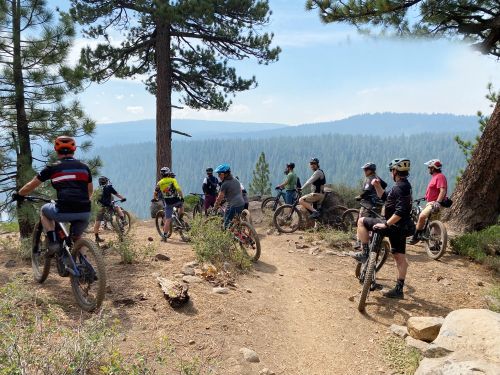A version of this article ran in the October issue of Bicycle Retailer & Industry News.
LAKE TAHOE, Calif. (BRAIN) — PeopleForBikes is urging land managers to allow the use of Class 1 e-bikes — but no other e-bikes — on all non-motorized, natural surface trails (including singletrack mountain biking trails) where traditional bicycles are allowed. The recommendation, if adopted by land managers, would ban unclassified e-bikes, higher powered Class 3 and throttle-controlled Class 2 bikes from the trails.
In what was billed as a major policy statement, the organization released the new recommendation at its inaugural eMTB Summit, held Sept. 14-15 at Palisades Tahoe Resort.
While lines are blurring, the speciality retail channel and its suppliers tend to favor Class 1 bikes, while Class 2 and 3 are more prevalent in the consumer-direct channel. Both Class 1 and 2 cut off motor assistance at 20 mph, but Class 2 allows riders to use the motor while coasting.
Currently the National Forest Service allows Class 1, 2, and 3 e-bikes on motorized roads and trails, but not on trails that don’t allow motorized vehicles. A March 2022 policy update allows forest managers to designate trails or other routes that are open to e-bikes but no other motorized vehicles. The update defines the three e-bike classes, but does not make allow or disallow any of the classes from trails. The National Parks Service and other public lands managers have varying policies.
The Class 1 recommendation was presented by PeopleForBikes’ Rachel Fussell and Dr. Ash Lovell. Fussell is the organization’s eMTB policy & program manager and Lovell is its electric bicycle policy & campaign director.
The recommendation was well-received by event attendees. Kent McNeill, the president of the International Mountain Bicycling Association said, "IMBA is encouraged that the industry is recognizing the complexities of eMTB management by recommending trail access be limited to Class 1 eMTBs on non-motorized trails.”
Jonathan Cook-Fisher, a Truckee District National Forest ranger who led a group e-bike ride at the event, said, “We wanted to focus on a single-class approach.” He added, “According to our research, Class 1 eMTBs are the most similar to traditional mountain bikes and they represent the most in-demand and frequently used type of eMTBs.”
However, suppliers of Class 2 bikes were less pleased. “Despite consumer demand to the contrary, the industry and cycling advocacy groups continue to demonstrate favoritism for Class 1 electric bicycles while simultaneously promoting inclusion,” said Don DiCostanzo, the founder and CEO of Pedego.
“There is no rational reason to exclude Class 2 electric bicycles anywhere Class 1 are allowed unless the goal is to promote exclusion.” Pedego sells its e-bikes, which are mostly Class 2, through over 200 licensed retailers in the U.S.
Proponents of Class 2 say the throttle allows riders to more easily get started from a stop. It generally is also a less expensive technology.
The Summit gathered 60 attendees to confront issues critical to the continuing growth of trails and sales.
While PeopleForBikes has held annual e-bike-specific strategy meetings since 2016, this was the first Summit meeting since the pandemic to focus solely on the rapidly emerging eMTB category.
Representatives from government, advocacy, industry companies and retail enjoyed a day of eMTB rides on a variety of the region’s trails, followed by a full day of sessions.
Speakers and panelists included Cassondra Spring, the global marketing director at Liv Cycling; Anna Baklund, program manager at Tread Lightly!; Greg Williams, the executive director of Sierra Buttes Trail Stewardship; and Shelli Fine of the Tahoe Tourism Office
Cook-Fisher summarized the Summit’s purpose: “We are here to prove that eMTBs have the same impacts as non-motorized acoustic bicycles,” he said. “The challenge is developing studies to demonstrate and prove what many feel are the on-the-ground impacts.”
Saul Leiken, Specialized’s USA category leader added, “PeopleForBikes is interested in building access for eMTBs without jeopardizing access for analog mountain bikes.
"The Tahoe Class 1 statement clarified how we hope to support land managers as they explore increasing access on the public lands they oversee.”


